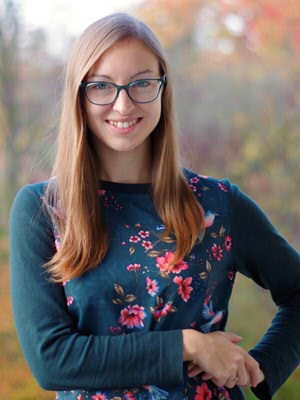Molecular Biophysics post-doc Adéla Melcrova wins prestigious Czech Prize
13 November 2019

Adéla Melcrova, who is a post-doctoral fellow in the Molecular Biophysics lab of Prof. dr. Wouter Roos at the Zernike Institute, has recently been awarded the prize of Josef Hlávka for the Best Czech Students and Graduates. The prize is intended for talented students who have shown special ability and intellectual creativity during their studies. Melcrova wrote her PhD thesis on the topic "Model membranes studied by advanced fluorescence techniques and molecular dynamics simulations" and clearly this impressive work convinced the jury to award her the prize.
The prize, 25 000 CZK, is handed out in the Chateau Lužany u Přeštic by the foundation Nadání Josefa, Marie a Zdeňky Hlávkových. The foundation is the oldest Czech foundation supporting science and arts. In 1904 it was founded by Josef Hlávka (1831 - 1908), an important Czech architect, builder, and philanthropist. The Josef Hlávka Prize is awarded to the best students and graduates of Prague public universities, Brno University of Technology and young talented scientists of the Academy of Sciences of the Czech Republic.
This prize is not the first award Melcrova has received. After finishing her PhD, Melcrova received a NWO Physics/f grant to pursue research in the lab of Wouter Roos. This individual post-doc grant is intended for women who wish to develop a long-term career in Dutch physics. The grant is awarded to researchers with an excellent track record and enables them to develop a solid position for the future. Melcrova uses this grant to further her research in the bacterial membrane & vesicle field, using advanced Atomic Force Microscopy and fluorescence techniques.
| Last modified: | 26 November 2019 09.52 a.m. |
More news
-
25 April 2025
Leading microbiologist Arnold Driessen honoured
On 25 April 2025, Arnold Driessen (Horst, the Netherlands, 1958) received a Royal Decoration. Driessen is Professor of Molecular Microbiology and chair of the Molecular Microbiology research department of the Faculty of Science and Engineering at the...
-
24 April 2025
Highlighted papers April 2025
The antimalarial drug mefloquine could help treat genetic diseases such as cystic fibrosis, Duchenne muscular dystrophy, as well as some cancers.
-
22 April 2025
Microplastics and their effects on the human body
Professor of Respiratory Immunology Barbro Melgert has discovered how microplastics affect the lungs and can explain how to reduce our exposure.
